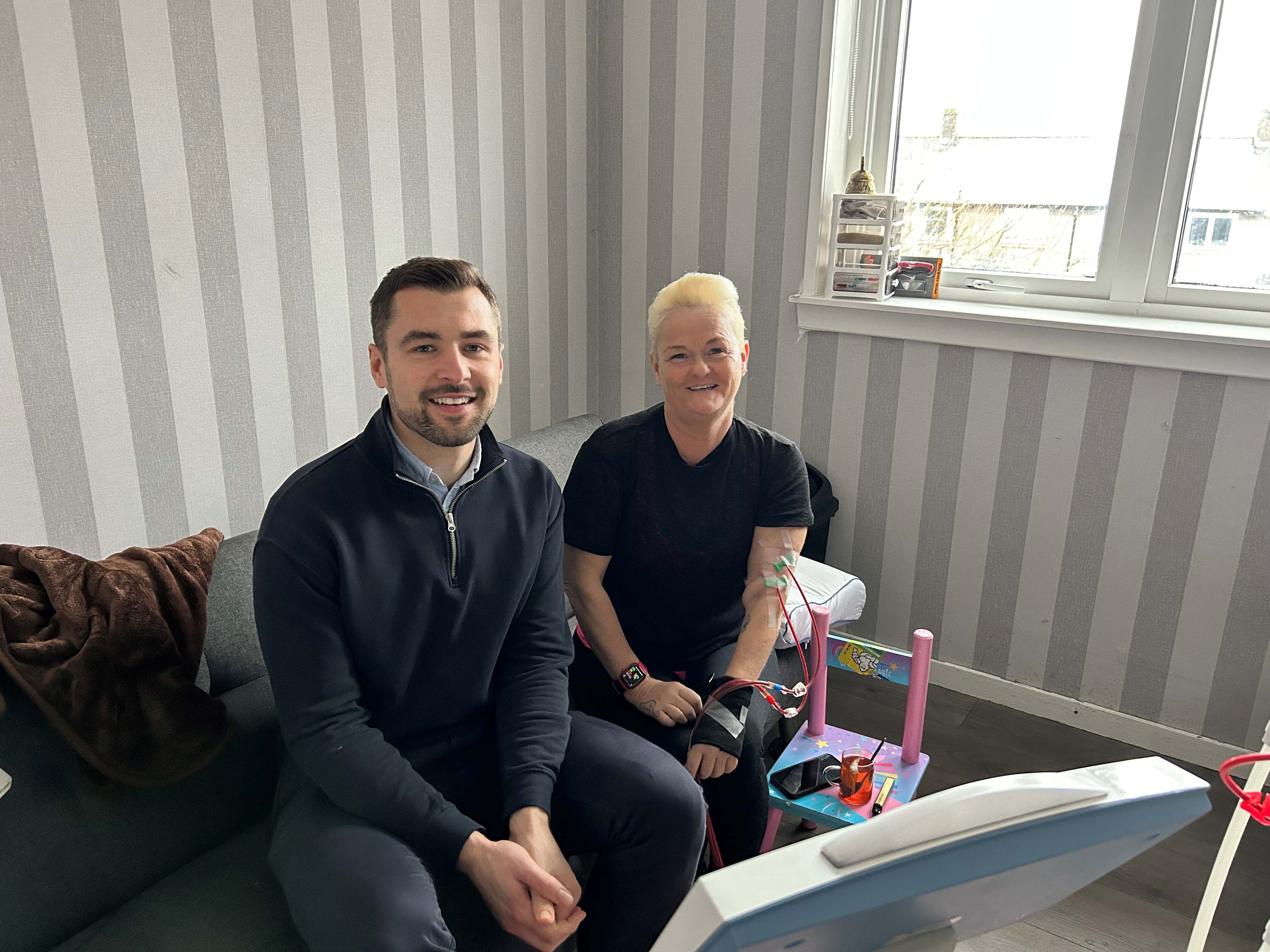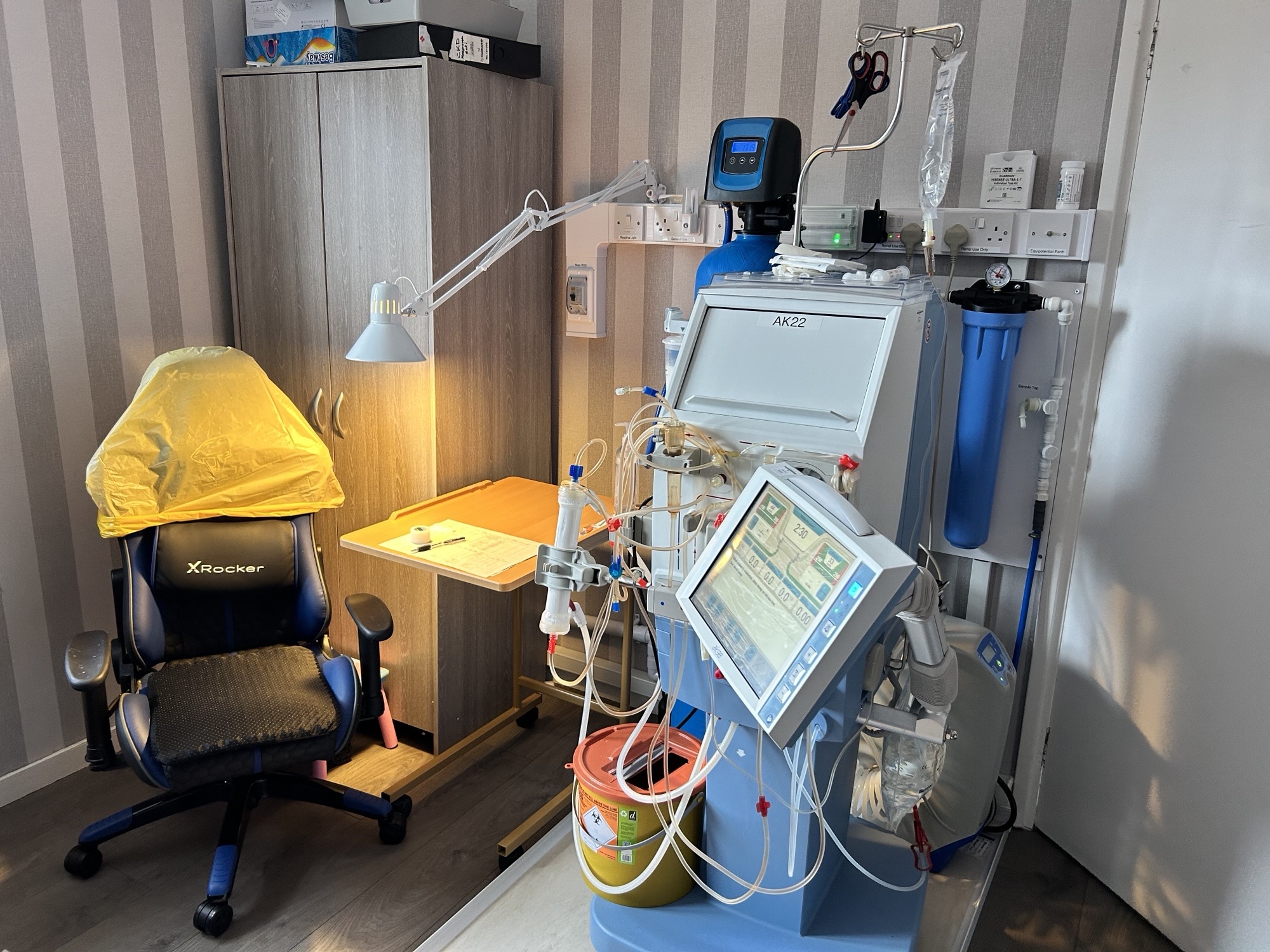Life-changing dialysis at home treatment to be offered across NHS Grampian
Published: 07/01/2025 08:50Dialysis patients across NHS Grampian are being given the option of moving to at-home treatment following a successful pilot of home haemodialysis.
The set up involves a period of education and training – and converting an area within people’s homes so specialist equipment can be installed, before treatment can begin. For patients who would typically have to attend a dialysis unit three times a week for around four hours at a time, and who may have lengthy commutes to and from their local unit, the chance to be treated at home can provide them with much more flexibility in their lives.
Service Manager Scott Arnot explained: “Haemodialysis ‘cleans’ the blood when a person’s kidneys aren’t working properly by running it through a machine filter to remove toxins and excess fluid.
Service Manager Scott Arnot explained: “Haemodialysis ‘cleans’ the blood when a person’s kidneys aren’t working properly by running it through a machine filter to remove toxins and excess fluid.
“While having this treatment at home isn’t suitable for everyone – and we will always respect individual wishes and circumstances – it can enable patients to enjoy a more normal and fulfilling lifestyle while reclaiming valuable time to spend with friends and family.”
Work to deliver this new dialysis at home option for patients has been ongoing for the last few years, as colleagues have worked through the development of a framework to ensure it’s safe and well supported. NHS Grampian is working alongside specialist contractors on the conversions and installations.
Scott added; “We managed to deliver the service for four patients as we worked through this test of change, and we’re now hoping to make it possible for 20 more during the next year. There are huge benefits for patients who have their care in their control and can decide when treatment works best for them and whether to dialyse more frequently for shorter periods. Our clinical nursing team will always be at the end of a phone, via video call and will also make routine visits.”
Victoria Adams-Ross (54) had a room converted in her Kincorth home for dialysis treatment in November and says that her experience so far has been life-changing, giving her more freedom to do the things she loves.
Victoria, who was first diagnosed with kidney disease at five months old, has spent most of her life without the need for haemodialysis but things took a turn for the worst and her kidney count dropped rapidly in 2021. She has been on the waiting list for a kidney transplant for three years, and in the meantime has to spend two and a half hours on dialysis five days every week.
Victoria Adams-Ross (54) had a room converted in her Kincorth home for dialysis treatment in November and says that her experience so far has been life-changing, giving her more freedom to do the things she loves.
Victoria, who was first diagnosed with kidney disease at five months old, has spent most of her life without the need for haemodialysis but things took a turn for the worst and her kidney count dropped rapidly in 2021. She has been on the waiting list for a kidney transplant for three years, and in the meantime has to spend two and a half hours on dialysis five days every week.
She explained: “The anxiety levels are so much less, as I was so stressed about getting the bus over to the unit in the mornings. It’s so much more relaxed at home – you’re in your own house, you can sit and watch TV, listen to music. I can have my heating on full blast with my electric blanket on and I choose what time I do my dialysis now. I’m beginning to feel better. I love to swim and I can swim in the morning and do the dialysis in the afternoon. That means I can sleep after if I need to. Sometimes before, having it in the morning would wipe me out for the rest of the day.”
Victoria is keen to raise awareness about what life is like for those living with kidney disease and says there are some common misconceptions.
She added: “People think you can do dialysis and go to work – some people are fine, others aren't. Sometimes dialysis makes me feel very ill and I need to use a zimmer frame or walking stick as I feel so dizzy and sick, other days I’m fine. Not everyone’s kidney disease is the same and if you get a transplant, it's not guaranteed to work.”
Getting up to speed with home treatment has been easier for Victoria as she got used to connecting herself to specialist equipment at the hospital. She said: “It was a shock to be thrown into having to do needles but I just so wanted to be at home. I just had a go one day and that was it – the staff show you how to use the machines and they wouldn’t let you take it home until you’re ready because they want to make sure it’s safe. Seeing all the equipment and stock needed in my home has been an eye opener.”
Anyone completing haemodialysis at home requires the support of another person. Victoria’s mum joins her most days and a friend comes over once per week. Victoria explained: “You can’t do it on your own. It’s a lot to ask people to give up their time, especially at this time of year, but it’s worth it. I no longer have to dialyse on a Saturday so I can visit my son and granddaughter in Arbroath. I missed out on so many things before, like celebrating my mum’s 70 years of volunteering, but I can go now.”
Victoria says she has always been a swimmer, inspired by her mum who trained to swim for Scotland as a child, and is now swimming 2km every day.
She said: “That’s my goal and it helps me mentally when I’m going through this. It keeps my heart healthy and it has just always been part of our lives. I don’t feel dizzy or sick when I’m swimming; I don’t know if that’s just me. Sometimes when I come out I have to go and sit down but when I’m actually in the water I’m fine.”

NHS Grampian supports around 250 haemodialysis patients (and rising) at any one time, across a network of specialist facilities. The purchasing of specialist equipment to make haemodialysis at home possible has been supported by NHS Grampian Charity.
Lisa Duthie, NHS Grampian Charity Lead, commented: “It’s wonderful to hear about the affects home haemodialysis is having on patients in Grampian, and the resulting positive impacts that has on people’s quality of life.
“We are incredibly grateful to our supporters whose generous donations funded this project, and we look forward to seeing more people benefit from at-home treatment during 2025.”
Lisa Duthie, NHS Grampian Charity Lead, commented: “It’s wonderful to hear about the affects home haemodialysis is having on patients in Grampian, and the resulting positive impacts that has on people’s quality of life.
“We are incredibly grateful to our supporters whose generous donations funded this project, and we look forward to seeing more people benefit from at-home treatment during 2025.”

